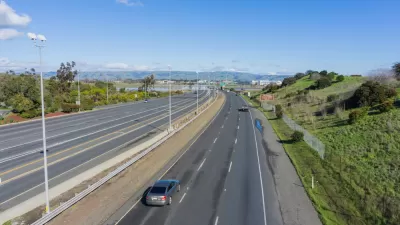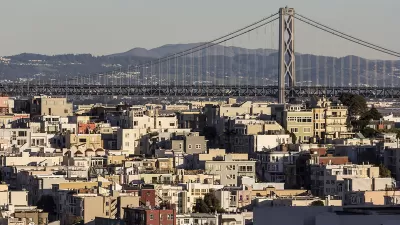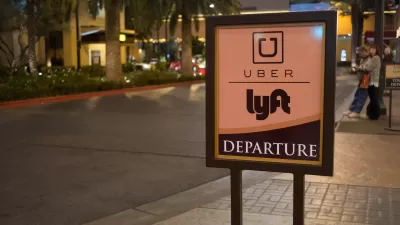Want to speed up your transit? Follow San Francisco's lead and let your passengers enter any door they please, says Yonah Freemark. A pilot program on the J-Church line is testing out the idea.
The new policy is the result of recommendations from the Transit Effectiveness Project (TEP) tasked by MUNI to speed things up. As Freemark notes, the average MUNI boss or train travels at an astonishingly slow 8 miles per hour, so any action towards speeding things up is desperately needed:
"Those slow speeds are an impediment to easy mobility throughout the city and discourage people from taking advantage of transit.* The causes of the slow speeds are multifarious: The fact that most rail and bus corridors are shared with automobiles, the high density of stops, and, of course, the requirement to board up front. The result have been disappointing reliability statistics: Most services arrive at their destinations on time less than 80% of the time."
Freemark discusses the tools that allow all-door boarding to happen, like a universal fare card and card readers.
FULL STORY: In San Francisco, All-Door Boarding Catches On

Manufactured Crisis: Losing the Nation’s Largest Source of Unsubsidized Affordable Housing
Manufactured housing communities have long been an affordable housing option for millions of people living in the U.S., but that affordability is disappearing rapidly. How did we get here?

Americans May Be Stuck — But Why?
Americans are moving a lot less than they once did, and that is a problem. While Yoni Applebaum, in his highly-publicized article Stuck, gets the reasons badly wrong, it's still important to ask: why are we moving so much less than before?

Using Old Oil and Gas Wells for Green Energy Storage
Penn State researchers have found that repurposing abandoned oil and gas wells for geothermal-assisted compressed-air energy storage can boost efficiency, reduce environmental risks, and support clean energy and job transitions.

Greening Oakland’s School Grounds
With help from community partners like the Trust for Public Land, Oakland Unified School District is turning barren, asphalt-covered schoolyards into vibrant, green spaces that support outdoor learning, play, and student well-being.

California Governor Suspends CEQA Reviews for Utilities in Fire Areas
Utility restoration efforts in areas affected by the January wildfires in Los Angeles will be exempt from environmental regulations to speed up the rebuilding of essential infrastructure.

Native American Communities Prepare to Lead on Environmental Stewardship
In the face of federal threats to public lands and conservation efforts, indigenous groups continue to model nature-centered conservation efforts.
Urban Design for Planners 1: Software Tools
This six-course series explores essential urban design concepts using open source software and equips planners with the tools they need to participate fully in the urban design process.
Planning for Universal Design
Learn the tools for implementing Universal Design in planning regulations.
Heyer Gruel & Associates PA
City of Moreno Valley
Institute for Housing and Urban Development Studies (IHS)
City of Grandview
Harvard GSD Executive Education
Salt Lake City
NYU Wagner Graduate School of Public Service
City of Cambridge, Maryland





























